HIT CHANNEL EXCLUSIVE INTERVIEW: March 2015. We had the great honour to talk with a legendary musician and producer: Jon Hiseman. He is best known as the drummer and bandleader of Colosseum. He has also formed Tempest (with Allan Holdsworth) and Colosseum II (with Gary Moore and Don Airey) and has played with Graham Bond Organisation, John Mayall & the Bluesbreakers, Barbara Thompson’s Paraphernalia, Georgie Fame, Jack Bruce, Andrew Lloyd Webber, Eric Clapton and Roland Kirk. Colosseum played their last show on 28 February at the Shepherd’s Bush Empire. Their latest studio album is the magnificent “Time On Our Side” (2014). Read below the very interesting things Jon told us:
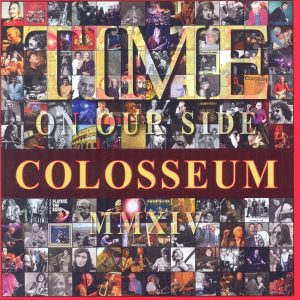 How emotional was the farewell tour of Colosseum and especially the final show at the Shepherd’s Bush Empire?
How emotional was the farewell tour of Colosseum and especially the final show at the Shepherd’s Bush Empire?
I think for some members of the band it was quite an emotional night, for sure. For me, personally, it has been a long time coming. Barbara’s situation, being 17 years into Parkinson’s, is slowly worsening because, as you know, there is no fix for Parkinson’s. So, I knew that if we managed to get back on the road this time, it would be the last. So, for me it was a long time coming. Actually, even without Barbara’s problem, I think it was a good time to stop when you are ahead of the game and I think we were on top form. Actually, Dave Greenslade (ed: keyboards) was actually not very well on the last night. He had a terrible flu virus and it really knocked him out. Under normal conditions, he shouldn’t have been on the stage. But, despite this, and judging by the comments we have received, it all worked. I think finishing the band now – well it’s the right time. It was the right time to finish the band in 1971. It was the right time to start it again in 1994 and I think it’s the right time to finish it now.
Is there any particular concept or basic idea behind the “Time On Our Side” album?
Well, we never thought about a concept. After the “Live05” album, we never thought we would make another studio album. In 2011 we started to look at ideas and at the songs we had, to see what we could do – I think it was a bit of surprise to everybody that we actually managed to put an album together so easily. Traditionally, the Colosseum albums are not too easy to make. I was never sure why. I think we always found it difficult to come up with material that was quintessentially Colosseum. We found it difficult to feed our particular monster, but there was something free about this album and it was quite easy to come up with the material that we recorded. I like the album very much because when I hear it, there’s a kind of easiness. Some of the early Colosseum music was quite tough and I am actually pleased that the spirit of this last one, is cooler. I hope the fans like it as much.
Are you currently involved in any other projects?
I am just finishing off the last few tracks of the final Barbara Thompson’s Paraphernalia album, called “The Last Fandango”. Fandango is a kind of Spanish dance, but in English “fandango” can also mean a kind of complicated or difficult situation. So, “The Last Fandango” is a kind of play on words, which really means it would be the last Paraphernalia album, because of course Barbara won’t be able to play for very much longer. So, my first priority is to finish this and release it later this year.
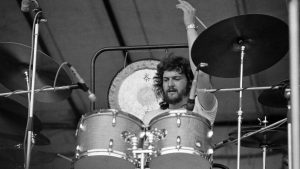 Are you satisfied with the feedback you got from fans and press for your biography “Playing the Band” (2010)?
Are you satisfied with the feedback you got from fans and press for your biography “Playing the Band” (2010)?
Yes, I am! Everybody seems to enjoy it very much. We sold a surprising number of copies…nearly 3.000 copies, which is a lot of books. And it’s also available now on Kindle. Maybe this year, but certainly early next year, a German translation will be coming out. It will be the complete original book with a new last chapter and more photos. Of course, Austria, Switzerland and Germany were always our biggest markets. They really loved the band and we did a lot of work there.
Are you proud of the classic album status that “Valentyne Suite” (1969) has?
Well, you know, I’m not the kind of person that listens to my own recordings. Once I finish it, sometimes I don’t hear it for many, many years. When we created it, we were not in a position to know what we had done. I don’t make judgments. If I decided that one album was terrible, I might not make another one. So, I don’t make judgments. We do everything to the best we can at the time and the moment the album is released, it’s a statement about that moment. But it’s not necessarily true for all times. It’s the audience makes it true. So, if the audience loves it, then it’s true. Only the audience can make the decision.
Do you miss Dick Heckstall-Smith (Colosseum, Graham Bond saxophonist)?
I can’t allow myself to miss Dick. He drank too much and he killed himself. I cannot be sorry for him. Nobody could help him and I know, because we tried. We had great times together; he was a wonderful, wonderful player and an interesting man with a strong character – but in the end too strong for his own good. Barbara came into the band because she was the only person who fitted. If she hadn’t come in, I would have finished the band when Dick died (ed: in 2004). She was on the first three albums, anyway – we used her when we wanted to double up the saxophone parts. She brought something completely different with her. And it may well be that, her difference is what you hear on “Time on Our Side”. She brought a gentler, more lyrical, side to the band and that shows the power of Barbara’s influence. And I’m very pleased about this, because I think maybe I was getting a little bit tired with the rough-tough side of Colosseum. It needed a bit more light and shade and when Barbara came in, that’s what we got and I know the rest of the band think the same thing, really. So, we made the best of everybody. Dick was a fantastic player, a crazy guy and we had so many funny times with him, so many laughs. But when it’s done, it’s done and now we can only look forward.
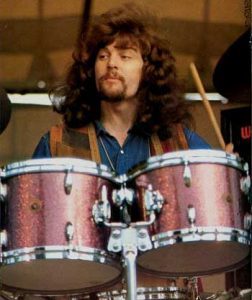 Were you frustrated with the lack of commercial success that Tempest had?
Were you frustrated with the lack of commercial success that Tempest had?
I’m not sure. At the time, I was, because things got pretty tricky and as we were living through those times it was very annoying, but in a strange way, when I first formed Tempest, I felt that we might be too late – running out of our time. However, when I formed Colosseum II, even as we went on the road, I knew its time was over… over before it started, commercially. The world had moved on, but we were still playing music from 10 years before. So, in a way the original Colosseum was a moment in time and Tempest was almost a moment in time, but Colosseum II was out of its time. But that doesn’t mean to say that we didn’t make some great music, or that we didn’t have some wonderful fans who followed us. Commercially there was never any chance for Tempest or Colosseum II and although that is a little annoying, I always understood why and it’s not a problem. Actually, the most successful band I ever played with is Barbara Thompson’s Paraphernalia. Most people don’t realise this, but we made and sold more albums and did more long tours with Barbara Thompson’s Paraphernalia than in any other band I played with. It was instrumental music and instrumental music doesn’t get the attention that music with vocals does. So, unless you were sitting in an audience watching the band, you probably wouldn’t realise that it was a very successful band.
Why Allan Holdsworth left Tempest after their first album?
He wanted to explore his vision for the guitar and he couldn’t do that in my world. He wanted to go further and further out and I didn’t want that in the band. He knew that, so we never had an argument about it, but it was clear after a year that he wanted to move on. No problem with that. Many musicians have to do this.
You have said that you were never interested in the drums. Can you explain that to us?
Well, the problem with the drums is you can’t play them by yourself. Yes, of course I play drum solos because Graham Bond made me play them when I joined. Ginger Baker (Cream, Blind Faith) had always played drum solos, so I had to play one, too. I mean, the drum solo was never important to me. I never practiced a single day on a drum solo and the drums were never as interesting to me as the influence the drums had on the band. So, if you want to be the ‘conductor’ of a rock ’n’ roll band, the best thing is to be the drummer. I was never interesting in the drums just to play the drums. I was interested in the drums to play inside the band, as I always thought that everything the drums played was already inside the band, anyway. All I did was give it a point, give it an edge. So I never really practiced after the first 6 or 7 years of playing. I turned professional when I was 22 years old and from than on I rarely practiced the drums. Of course I kept in shape between tours, but practicing is for doing things you can’t already do and I never had any time for that. I just developed my style inside the bands I played with and I tried to play the music of the band, not the drums.
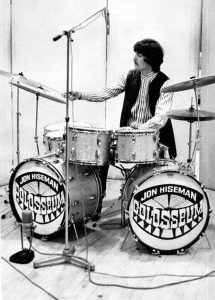 There are hundreds of wonderful drummers around. You can see them on Youtube, they play crazy stuff, but almost none of them play with bands, or if they do play with bands, they use the band to show the drums off. That’s no good. You have to get right inside the band when you are a drummer. You’ve got to get right into the musicians…inside their heads and you have to give them the confidence to fly. And that’s what a drummer does. It has nothing to do with playing the drums. The physical business of playing the drums is not for itself. Actually, the physical business of playing any instrument is not what it‘s about. Barbara Thompson has had Parkinson’s disease for 17 years and in the past 4 years she couldn’t play at all, not compared with what she could play 10 years ago. Now, when she plays, her instrument isn’t there…what she does, the sounds she produces, goes directly to the soul of the listener…her instrument is completely invisible because she has no real ability to play the instrument, but when she plays the “Valentyne Suite” with Mark Clarke (ed: bass and vocals) singing , grown men cry. She can do that, she can touch people. That’s what Colosseum does too. Colosseum isn’t about the instruments, it’s not about the guitar playing, it’s not about the drumming, it’s not about anything. The instruments are transparent. The strange mix of personalities somehow touches the audience. I don’t know how it works, but I know what it is. So, if you are a musician, if you are a player, forget your instrument. Your instrument has to be transparent in your hands. The drums have always been transparent in my hands. I am working on a different level to the instrument. The instrument doesn’t matter.
There are hundreds of wonderful drummers around. You can see them on Youtube, they play crazy stuff, but almost none of them play with bands, or if they do play with bands, they use the band to show the drums off. That’s no good. You have to get right inside the band when you are a drummer. You’ve got to get right into the musicians…inside their heads and you have to give them the confidence to fly. And that’s what a drummer does. It has nothing to do with playing the drums. The physical business of playing the drums is not for itself. Actually, the physical business of playing any instrument is not what it‘s about. Barbara Thompson has had Parkinson’s disease for 17 years and in the past 4 years she couldn’t play at all, not compared with what she could play 10 years ago. Now, when she plays, her instrument isn’t there…what she does, the sounds she produces, goes directly to the soul of the listener…her instrument is completely invisible because she has no real ability to play the instrument, but when she plays the “Valentyne Suite” with Mark Clarke (ed: bass and vocals) singing , grown men cry. She can do that, she can touch people. That’s what Colosseum does too. Colosseum isn’t about the instruments, it’s not about the guitar playing, it’s not about the drumming, it’s not about anything. The instruments are transparent. The strange mix of personalities somehow touches the audience. I don’t know how it works, but I know what it is. So, if you are a musician, if you are a player, forget your instrument. Your instrument has to be transparent in your hands. The drums have always been transparent in my hands. I am working on a different level to the instrument. The instrument doesn’t matter.
How difficult was to get a record deal for Colosseum II?
It was very difficult. We wanted to call the band Ghost. We thought Ghost was a good name. We tried for 9 months or so to get a deal and nobody would give us one. They didn’t think the music was commercial. Finally Gerry Bron (ed: producer, manager and boss of Bronze Records) said: “Just call it ‘Colosseum something’ and I’ll give you a record deal”. So, I rang up all the guys and I said: “Look, I can’t get a record deal and I am very much in debt because it has taken me 9 months to get this band together and I spent a lot of my own money doing it, The only chance to get that money back, is to get the band on the road. Is it ok if I call the band Colosseum II?” Everybody in the band was so busy with their own projects that they said: “Not a problem. Do it”. So, we called it Colosseum II, but actually the band was always really Ghost.
How did you first come in contact with Andrew Lloyd Webber?
Colosseum II made an album called “Electric Savage” (1977) when we were signed to a record company called MCA, which happened to be the same company that issued “Don’t Cry for Me Argentina” from Andrew Lloyd Webber’s “Evita” (1976). Andrew happened to be in the office one day, talking to them about a new project, when he heard our record playing our record in another office. He immediately asked: “Who’s that? It’s the sound I want for my new record”. So, a couple of days later, he rang me and he said: “Please, come over and see me”. So, I went and he played the whole of “Variations” (1978) on the piano to me. When I left his place, I couldn’t remember anything much, but I felt that this is something we should get involved with, because this man – who I never met before – seemed to me to be really enthusiastic and clever. So, we went in the studio for two weeks and recorded “Variations” and after that I stayed as his drummer right through to the first weeks of “Cats” and Barbara, who I introduced to Andrew when he was looking for a woodwind/sax player, stayed with him until the end of “Requiem”.
 Was Graham Bond an easy-going person to work with?
Was Graham Bond an easy-going person to work with?
No, he was a nightmare to work with. He was a heroin addict, a serial heroin addict and heroin addicts are very difficult to work with. He was a very clever, bright, sharp man and a very gifted musician, but he was a heroin addict, which made him extremely difficult.
Did you feel a lot of pressure when you replaced Ginger Baker (Cream) in Graham Bond Organisation?
No. I had only seen him playing twice before and I didn’t feel any pressure at all, because I knew that my style was so different from his. Graham Bond had already heard me playing about a year before with a big band and apparently he turned to Dick and said, “If Ginger ever leaves us, he would be the new drummer”. I didn’t feel any pressure at all as I knew that they wanted me and I knew that they liked what I did, so I didn’t try to change anything and just tried to be myself. I was never good at copying drummers, anyway. I couldn’t copy anybody.
Do have happy memories of the period you played with John Mayall & the Bluesbreakers?
Yes, John was a fantastic guy and I got on very well with him. And occasionally, we still meet up at festivals, we chat and laugh. He is a very nice man who made band-leading look easy. That’s why so many people left him to form their own groups. Very clever guy.
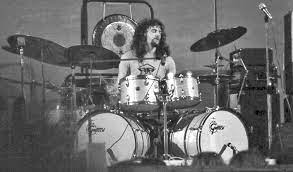 When you recorded the original version of “Theme for an Imaginary Western” with Jack Bruce, had you realised that it was one the greatest songs ever written?
When you recorded the original version of “Theme for an Imaginary Western” with Jack Bruce, had you realised that it was one the greatest songs ever written?
No. We did long sessions through the night for that album (ed: “Songs for a Tailor”- 1969) with Jack. At the time, I wasn’t sure what I was doing. We played all the tracks many, many times. There was no easy recording of this album. When I heard it finished, though, I was amazed. It’s still one of my favourite albums to listen to. In fact, it’s probably the only album I actually listen to (laughs) of all the things I have done. I recorded a lovely album in Rio de Janeiro in 1980 called “A Night in the Sun” which I also listen, because I love it. I made it with Marcio Montarroyos and some other Brazilian musicians.”. “A Night in the Sun” and “Songs for a Tailor” are the two albums I listen to of my own playing, I think.
Do you remember the amazing jam you did at the “Supershow” (26 March 1969) with Eric Clapton, Roland Kirk, Jack Bruce and Dick Heckstall-Smith? I’ve watched it on Youtube !!
Well, I know I did it but I don’t really remember anything about it. If it’s on Youtube! I’ll have a look. It was one of those things: we were working almost every day… the agency would send us a date sheet once a week which told us “Go to this place”. So, we would go to this place. We did what we were told and when we finished playing, we left (laughs) to go immediately to the next gig. I don’t remember really much about it.
Why do you believe that jazz music is finished?
The problem is: I haven’t heard any jazz music development for the last 30 years. You can hear the beginnings of it in Storyville in the early 1900s. And it changed through the years, but you could see it as the same thing with the same targets and the same systems running right the way through, until, probably, Miles Davis. But after that, it changed and it lost the audience. The audience couldn’t hear it anymore. It became too technical, too difficult. It didn’t work at the centre of the soul anymore. And so, it got lost. And it’s still lost. There will always be one or two artists who touch audiences and who happen to play jazz. For a brief moment the audience will be in love with them and touched by jazz again. But basically, I think that as an art form, it‘s got stuck. And it won’t change much now. New things will come and young people will be excited by different music, I think. Or maybe it will come back around again. I can’t tell. But most of the great players are dead and the young players basically sound like copies. This is not so good. However, I do like playing jazz when I can.
 Can you tell us a few words about your old friend, Jack Bruce who passed away some months ago?
Can you tell us a few words about your old friend, Jack Bruce who passed away some months ago?
Jack was one of the great bass players and songwriters of his era. He was a marvelous singer. Everything came from the centre of his heart. He played unique bass, but it was never technical bass. He wrote marvelous music, which he married to some very clever words – usually from Pete Brown (ed: Cream lyricist). Jack was a unique talent who, I don’t think, ever got the commercial recognition that he deserved, probably because he was basically just too good. He was a wonderful, wonderful musician and a wonderful, wonderful person, who was a great inspiration to me in my early days and gave me a lot of encouragement. It was great to meet up with his son Malcolm recently, when his band supported us at the Shepherds Bush Empire, our last ever concert.
Had you ever met Jimi Hendrix?
Yes, I was with him on the band bus that took the musicians from the airport to the Fehmarn Festival, in North Germany. It was the last festival he played (ed: on 6 September 1970). He died I think about a couple of weeks later. He was completely gone, completely out of his head on drugs. Another tragic, tragic story of a great talent wasted.
A huge “THANK YOU” to Mr. Jon Hiseman for his time and to Mr. Colin Richardson for his valuable help.
Official Jon Hiseman website: www.temple-music.com
Official Colosseum Facebook page: www.facebook.com/Colosseum.Band

